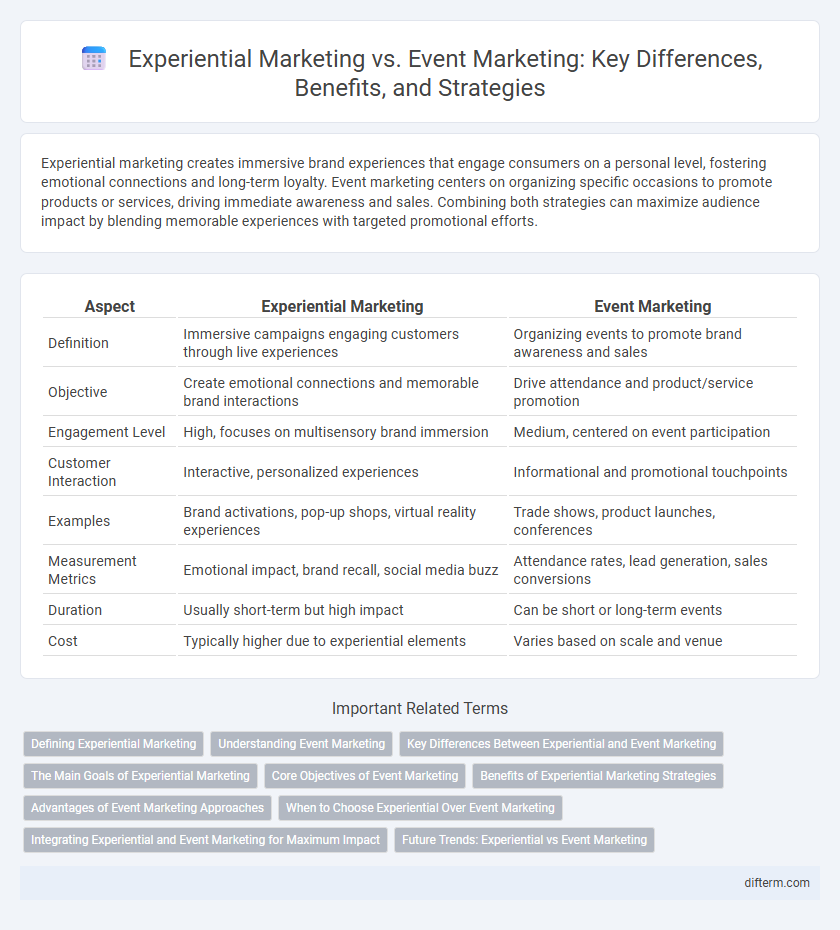Experiential marketing creates immersive brand experiences that engage consumers on a personal level, fostering emotional connections and long-term loyalty. Event marketing centers on organizing specific occasions to promote products or services, driving immediate awareness and sales. Combining both strategies can maximize audience impact by blending memorable experiences with targeted promotional efforts.
Table of Comparison
| Aspect | Experiential Marketing | Event Marketing |
|---|---|---|
| Definition | Immersive campaigns engaging customers through live experiences | Organizing events to promote brand awareness and sales |
| Objective | Create emotional connections and memorable brand interactions | Drive attendance and product/service promotion |
| Engagement Level | High, focuses on multisensory brand immersion | Medium, centered on event participation |
| Customer Interaction | Interactive, personalized experiences | Informational and promotional touchpoints |
| Examples | Brand activations, pop-up shops, virtual reality experiences | Trade shows, product launches, conferences |
| Measurement Metrics | Emotional impact, brand recall, social media buzz | Attendance rates, lead generation, sales conversions |
| Duration | Usually short-term but high impact | Can be short or long-term events |
| Cost | Typically higher due to experiential elements | Varies based on scale and venue |
Defining Experiential Marketing
Experiential marketing creates immersive brand experiences that engage consumers on a sensory and emotional level, fostering deep connections beyond traditional advertisements. Unlike event marketing, which centers on organizing specific occasions to promote products or services, experiential marketing integrates interactive elements that encourage active participation and memorable interactions. This approach drives higher engagement rates, brand loyalty, and word-of-mouth promotion by making consumers feel personally involved in the brand story.
Understanding Event Marketing
Event marketing involves organizing live or virtual events to promote products or brands, creating direct engagement opportunities for target audiences. It emphasizes planned, often one-time occasions like conferences, trade shows, or product launches to generate leads and brand awareness. Understanding event marketing requires recognizing its focus on structured experiences that facilitate real-time interaction and measurable outcomes.
Key Differences Between Experiential and Event Marketing
Experiential marketing creates immersive brand experiences that engage consumers through interactive, sensory activities, fostering emotional connections and long-term loyalty. Event marketing focuses on organizing specific occasions such as trade shows, product launches, or conferences to promote a brand or product within a defined timeframe. The key difference lies in experiential marketing's emphasis on deeper consumer engagement and brand immersion, whereas event marketing primarily targets awareness and exposure during particular events.
The Main Goals of Experiential Marketing
Experiential marketing aims to create immersive and memorable brand interactions that foster emotional connections and encourage consumer engagement. Its primary goals include enhancing brand loyalty, driving word-of-mouth promotion, and providing personalized experiences that differentiate the brand from competitors. This strategy emphasizes authentic, sensory-rich encounters that transform passive audiences into active participants.
Core Objectives of Event Marketing
Event marketing primarily aims to create direct engagement between brands and audiences through carefully planned experiences that strengthen brand awareness and loyalty. Core objectives include driving product trials, generating leads, and boosting sales by crafting immersive, memorable interactions at live or virtual events. Measuring attendee engagement and capturing actionable data are essential to evaluating the success and ROI of event marketing campaigns.
Benefits of Experiential Marketing Strategies
Experiential marketing strategies create immersive brand experiences that foster deeper emotional connections, resulting in higher customer engagement and loyalty compared to traditional event marketing. By leveraging sensory stimuli and interactive participation, these strategies drive stronger brand recall and word-of-mouth promotion. Brands utilizing experiential marketing often see increased conversion rates and more meaningful data collection through direct consumer interactions.
Advantages of Event Marketing Approaches
Event marketing offers direct customer engagement through immersive brand experiences, increasing emotional connection and brand recall. It enables real-time feedback and data collection, enhancing targeted marketing strategies and ROI measurement. Large-scale events create buzz and media coverage, amplifying brand visibility and attracting diverse audience segments effectively.
When to Choose Experiential Over Event Marketing
Experiential marketing excels when brands aim to create deep emotional connections and memorable interactions that foster long-term customer loyalty. Choosing experiential strategies is ideal for launching new products or rebranding efforts, as immersive experiences engage multiple senses and encourage active participation. In contrast, event marketing suits objectives centered on awareness or networking without extensive audience involvement.
Integrating Experiential and Event Marketing for Maximum Impact
Integrating experiential marketing with event marketing creates immersive brand experiences that foster deeper emotional connections and lasting impressions. Combining interactive elements and sensory engagement within structured event formats enhances customer participation, brand recall, and conversion rates. Leveraging data analytics to tailor experiences ensures targeted messaging and measurable impact, maximizing return on investment.
Future Trends: Experiential vs Event Marketing
Future trends in marketing highlight a growing shift towards experiential marketing, which prioritizes immersive, interactive brand experiences over traditional event marketing's static presentations. Advances in technology, such as augmented reality and AI-driven personalization, are enhancing experiential campaigns by creating deeper consumer engagement and emotional connections. Despite this, event marketing remains essential for large-scale brand awareness, but its integration with experiential elements is shaping the future of highly dynamic and memorable marketing strategies.
Experiential marketing vs event marketing Infographic

 difterm.com
difterm.com